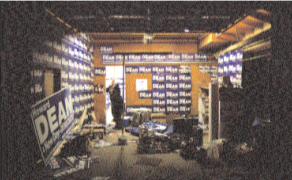FEBRUARY 8TH—
PROLOGUE AS EPILOGUE
There are facts and truths and political truths but there’s always another story and it’s hard, oh so hard, to trust the media. The fact is that Howard Dean has stated he will drop out of the race for president if he does not win Wisconsin. That’s the truth on the ground as the wheels of ATA Flight 936 kiss the pavement at Midway Airport on the South Side of Chicago late Sunday night. In response, hundreds of thousands of dollars are raised on the Dean for America website to fund Howard Dean’s last stand. But what if Dean didn’t say that? What if that was just an email from Roy Neel, his campaign manager, thinking aloud and then accidentally hitting the send button? And if Howard Dean denied it the next day? Would it be too late?
The roads north of Chicago are slick with ice. By three in the morning the only vehicles other than my own are tractor-trailers jackknifed on the side of the tollway, their blinking lights blurred by the snow. The campaign has staked everything on a Wisconsin victory, whether it meant to or not. The former front-runner and presumptive candidate has yet to win a primary. The John Kerry machine has been leaving tire prints across the field and the race is not as close as it looks if you’re just counting delegates. It takes 2,161 delegates to lock down the Democratic nomination for president. The numbers, nine days before the Wisconsin primary, have John Kerry with 320 compared to 136 for Howard Dean. But if you look closer you’ll see a different story. Most of Dean’s delegates are super-delegates, political officials like mayors and sheriffs who operate outside of the primaries and caucuses, who gave their support to Dean back when he was the hottest ticket in town. But super-delegates often change their minds and their votes are only as good as what they expect in return. Of the pledged delegates—the delegates elected in primaries and caucuses—Dean is dead last. Several super-delegates have already switched to John Kerry. The American Federation of State, County, and Municipal Employees has pulled its support, saying they’ll hold out for the general election. This is a story about abandonment.
This is also a story written for people who already know the ending. Like in the movie Casino, which opens with a scene of Robert De Niro exploding from his car in a small Las Vegas parking lot. Cut back to the beginning: music, dice, money, and Sharon Stone.
But this is not about Las Vegas. This is about the American electoral process and the seventeenth state, a frozen...
You have reached your article limit
Sign up for a digital subscription and continue reading all new issues, plus our entire archives, for just $1.50/month.
Already a subscriber? Sign in





